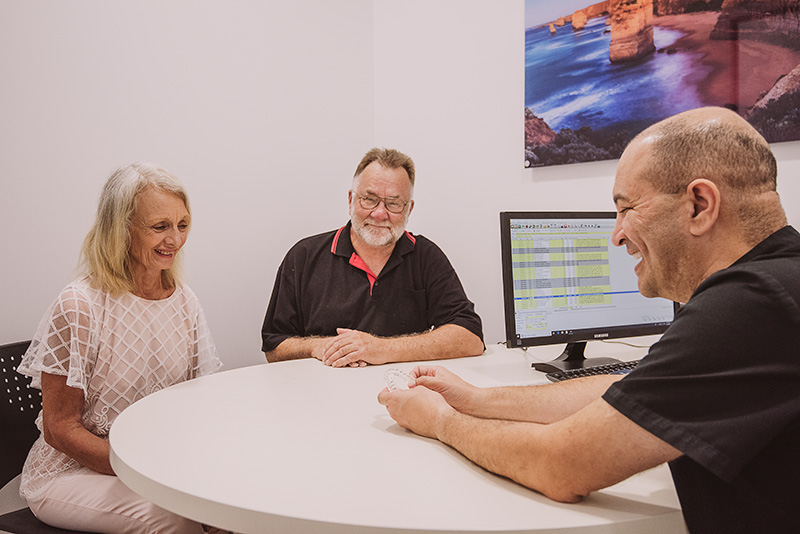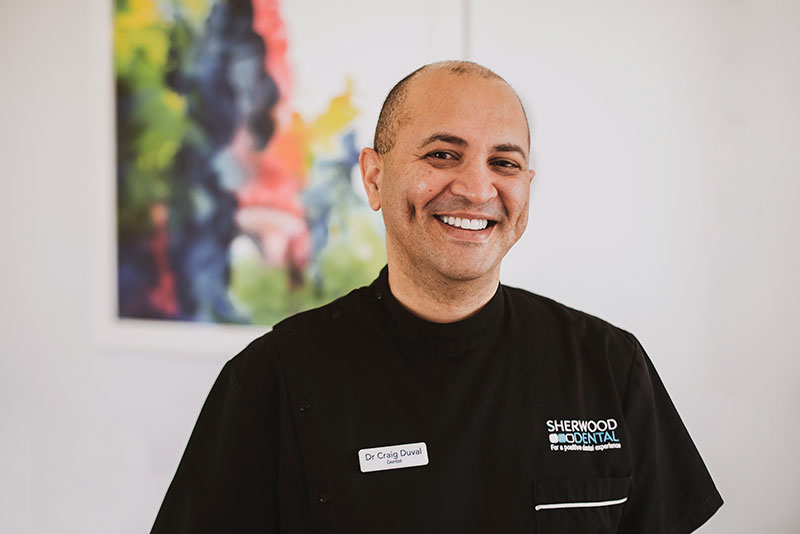MOUTHGuards & Appliances Sherwood
The full spectrum of
Dental Guards and Appliances
Sherwood Dental offers a comprehensive range of mouthguards and appliances from our Sherwood dental practice. If you are looking for a dentist in Sherwood that will provide the care you need while ensuring your comfort is put first, look no further. The team at Sherwood Dental pride themselves on providing a positive experience for each and every patient that visits our Sherwood practice.
Guards and appliances can play an important role in either protecting your smile or relieving harmful dental conditions and symptoms. Our comprehensive range of guards and appliances includes:

Sports Mouthguards
The Australian Dental Association (ADA) have released recommendations for protection from dental injuries during sport. Download the ADA recommendations here.
The specialised mouthguards which are custom fitted here at our Sherwood practice are created with a plastic material called Ethylene Vinyl Acetate (EVA). EVA is strong and durable and can be easily moulded and modified in order to fit precisely and comfortably over your teeth and gums. This allows the most ideal protection during impact and also allows speech and normal breathing during play.
Compare over-the counter and custom-made mouthguards here
Professionally-designed, bespoke mouthguards are often considered to be the most effective protective pieces of equipment to help prevent injury to the mouth, offering simultaneous protection of the teeth, lips, cheeks and tongue. A mouthguard may not only protect your mouth, it can also cushion any potential blows to the mouth or jaw. This can help to prevent damage to the jaw, neck or brain.
Having one of our dental professionals take individual impressions of your dental arches can help to create a guard to fit seamlessly into your mouth, teeth and gums, in order to provide the ultimate protection. The steps taken to create your mouthguard are often very simple: one of our dental professionals will take moulds of your teeth in both your upper and lower arches. These moulds will then be sent to our dental laboratory where our technicians can create a custom-made mouthguard.
Your sports mouthguard will need to be replaced over time. This can be a simple process – just bring your mouthguard along to your appointment and our dental professionals can assess the degree of wear and tear.
Sleep Appliances
Snoring occurs during sleep when the nose or the area at the back of the throat relaxes and narrows. This can then restrict the air movement in the passage, which can result in the vibration sound we recognise as snoring.
There are many causes for snoring, some of which our patients can control:
- Having excess fatty tissue around the neck or being overweight.
- Smoking can cause inflammation of the airways which can irritate the nasal passages.
- Excessive consumption of alcohol can slow the brains responses causing more relaxation than usual.
- Medication, antihistamines and sleeping pills in particular can also have the same effect as alcohol.
Some causes our patients cannot control:
- Allergies which can trigger swelling of the nasal passages, asthma, colds or sinus infections.
- Having enlarged adenoids, a narrow throat or a cleft palate can all contribute to snoring.
- Ageing or middle-aged men in general can have a wider neck and a higher level of soft tissue which can cause a vibration.
The most concerning type of snoring can stop the breathing all together – this is called Obstructive Sleep Apnoea (OSA) and can be moderate to severe. In milder instances the airways can become greatly narrowed but do not close. This can result in shallow breathing and loud snoring. More severe type of OSA can be caused by the lack of muscle tone in the upper airway, causing the airway to close fully, accompanied by one or more pauses in the breathing. The body’s natural reaction causes you to breathe again, normally with a gasp. It can be a very difficult condition to diagnose and many people who have sleep apnoea do not know they have it, as it only happens during sleep. If you have a partner, they can often be the first to notice the signs.
The main causes of Obstructive Sleep Apnoea
While being overweight or having an excess of fatty tissue around the neck is one of the most common causes. Despite this, some people who have sleep apnoea are not particularly overweight. Enlarged tonsils can also be a common cause, especially in children. Once sleep apnoea is suspected our dental professionals will carry out a sleep study in order to confirm the diagnosis.
How Sherwood Dental can help with snoring
There are many products on the market to help with snoring however our dental professionals can create a device that is suited to your particular condition. This device is called a Mandibular Advancement Device and it works by holding your lower jaw and tongue forward in order to keep your airway open while you sleep.
Grinding Appliances
Grinding of the teeth is a surprisingly common concern and often happens whilst asleep. Most people are therefore unaware that they are grinding their teeth and only become aware of it when their partner complains of the noise during the following morning.
More in-depth information is available on teeth grinding (or bruxism) here.
Some other noticeable effects of grinding (bruxism) are:
- Jaw pain
- Ear ache
- Facial and neck discomfort
- Sleep disorder or tiredness upon waking
- Sensitivity to hot or cold drinks
Why do people grind their teeth?
The most common cause of grinding is when we try and compensate for an imperfect bite. This is when the upper and lower jaw comes together but the teeth don’t seem to fit comfortably and you therefore try and force them into a perfect bite. Imagine chewing hard but with no food in your mouth.
Some patients can also suffer from jaw clenching, which when combined with grinding, can ultimately cause greater discomfort and damage to the teeth. It is also widely believed that stress can lead to grinding although you may be equally unaware that you are doing so as, like grinding, it can often happen during your sleep.
What are some of the common consequences of grinding?
As you may try to compensate for the imperfect bite you may actually end up biting down harder and thus causing damage to the enamel on your teeth. It has the potential to become a vicious circle because as you bite harder to try and make the teeth fit better you end up creating more damage to your teeth. The damage occurs as you eventually progress from wearing down the tooth’s enamel to gradually wearing down the tooth itself.
How can grinding be treated?
As most grinding occurs during your sleep, the most common solution can be the use of a mouthguard to help prevent grinding and the associated symptoms. This can help reduce the pressure of teeth grinding, while also helping to prevent further damage to your teeth. Your dentist may also be able make adjustments to your teeth order to establish a more correctly aligned bite and thus reduce the subconscious effort you are making. Naturally, if your grinding is a result from stress then our dental professionals will suggest that you implement relaxation techniques and stress management tools.
Ask Dr Craig Duval
Have a question about guards and appliances?
Our friendly team is here to help!

